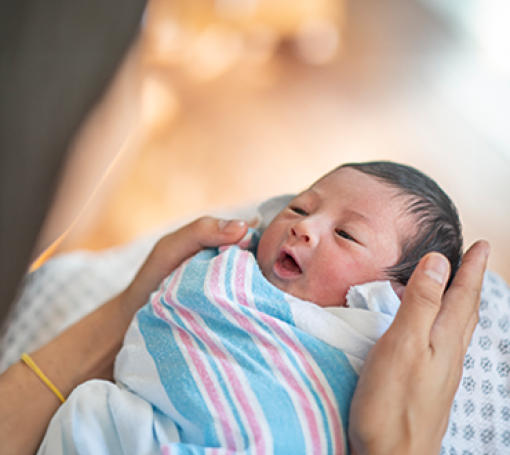
What causes vomiting and diarrhea?
Vomiting and diarrhea in children is typically caused by a virus affecting the stomach. Vomiting is the body’s way of protecting the intestines from germs. Diarrhea is the body’s way of getting rid of germs. Vomiting from a stomach virus typically lasts less than 24 hours as long as your baby remains hydrated. Diarrhea will continue until all the germs are out of the body. This may last intermittently for 1-2 weeks, but should improve with time, hydration, and return to solid foods.
How can I care for my child if they are vomiting?
Support your child by helping to prevent dehydration. Dehydration is when the body has lost too much water. Use the chart below as a guide to rehydration if your child if vomiting.

When should I seek medical attention?
Seek medical attention if:
- Vomiting is severe (nothing kept down for 8 hours)
- Vomiting lasts for over 24 hours
- Your child shows signs of dehydration (8 hours without a wet diaper for babies, 12 hours without a urinating for children, or no visible tears when your child cries)
- Your child is vomiting essential medication
- There is blood in your child’s vomit or diarrhea
- Diarrhea becomes severe (>8 per day)
Should I give my child medication if they are vomiting?
Over the counter medications should be avoided when your child is vomiting. If your child has a high fever, you can use an acetaminophen suppository. Ibuprofen should be avoided, as it can irritate the stomach.
When can my child return to day care?
Your baby can return to daycare after 24 hours of no vomiting or diarrhea. If a fever occurred, they must also keep their temperature <100.4° F without the use of fever-reducing medication for 24 hours.
Does my child need to follow a special diet when restarting solids?
Your child does not need to follow a specific diet when restarting solids. We do recommend offering your child whole, unprocessed foods that are easier to digest. Your child will be ready for a normal diet within 24-48 hours after their vomiting has stopped.
Should I give my child prebiotics or probiotics?
It is not required to give your child prebiotics or probiotics following a stomach virus but it may help restore healthy bacteria in their gut. If you already have probiotics in your home, you can sprinkle it on your child’s food. Alternatively, you can offer your child yogurt, which is a natural source of probiotics.
What should I do if my child continues to have diarrhea?
Continue to promote hydration and avoid sugary drinks. If diarrhea continues, have your child avoid cow’s milk for 2 weeks (cheese and yogurt is okay). The enzyme in the intestines that helps in the digestion milk is often disrupted during stomach viruses and takes time to regrow.
Keep Reading
View All Posts
The Importance of Routine Childhood Vaccines: What Families Need to Know
Staying informed and protected with Allegro Pediatrics.

Helping Kids Breathe Easier
By checking asthma control at every well care visit, we can identify changes early and make sure each child has the support they need to breathe comfortably and stay active.

Protecting Your Newborn from Hepatitis B
Learn why the birth dose of the hepatitis B vaccine matters for every baby.

